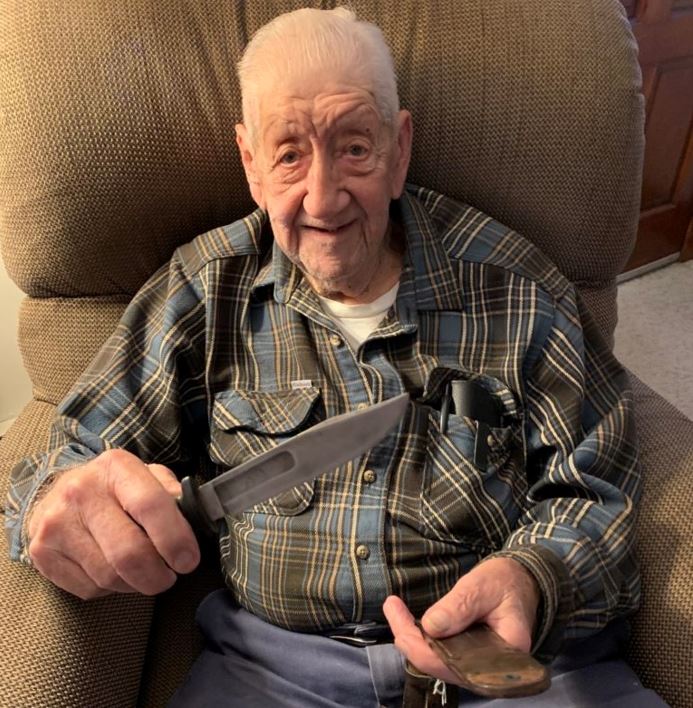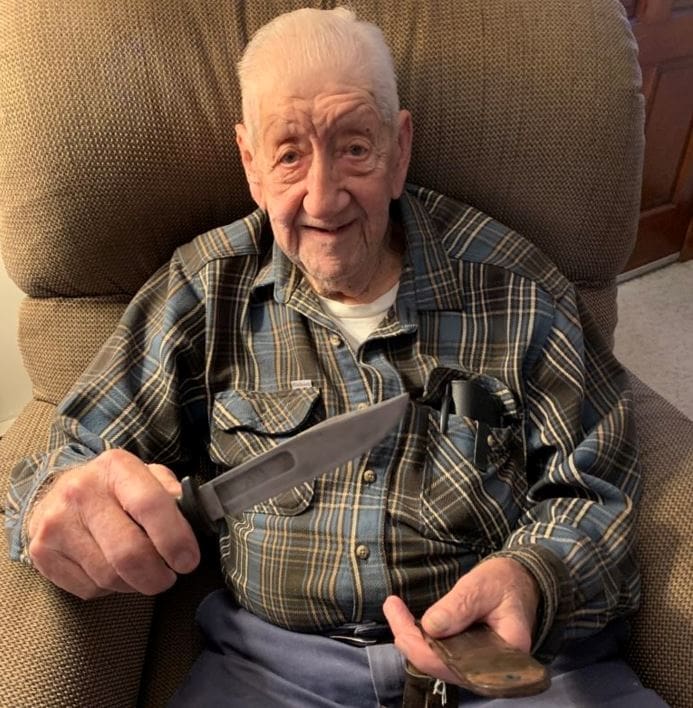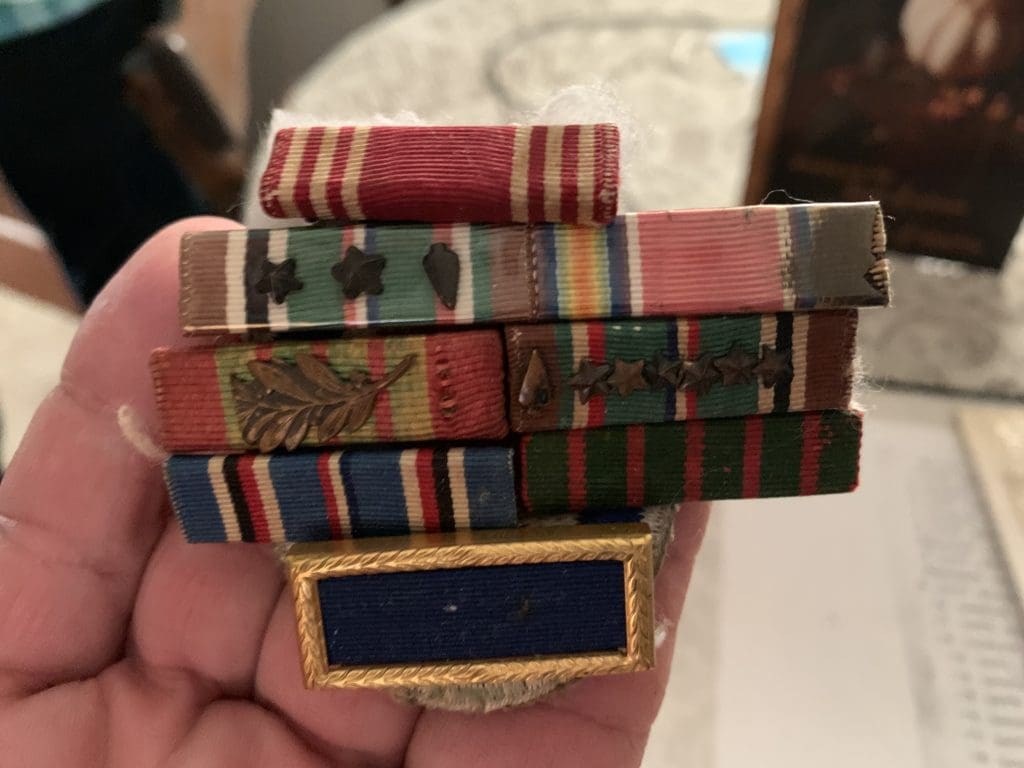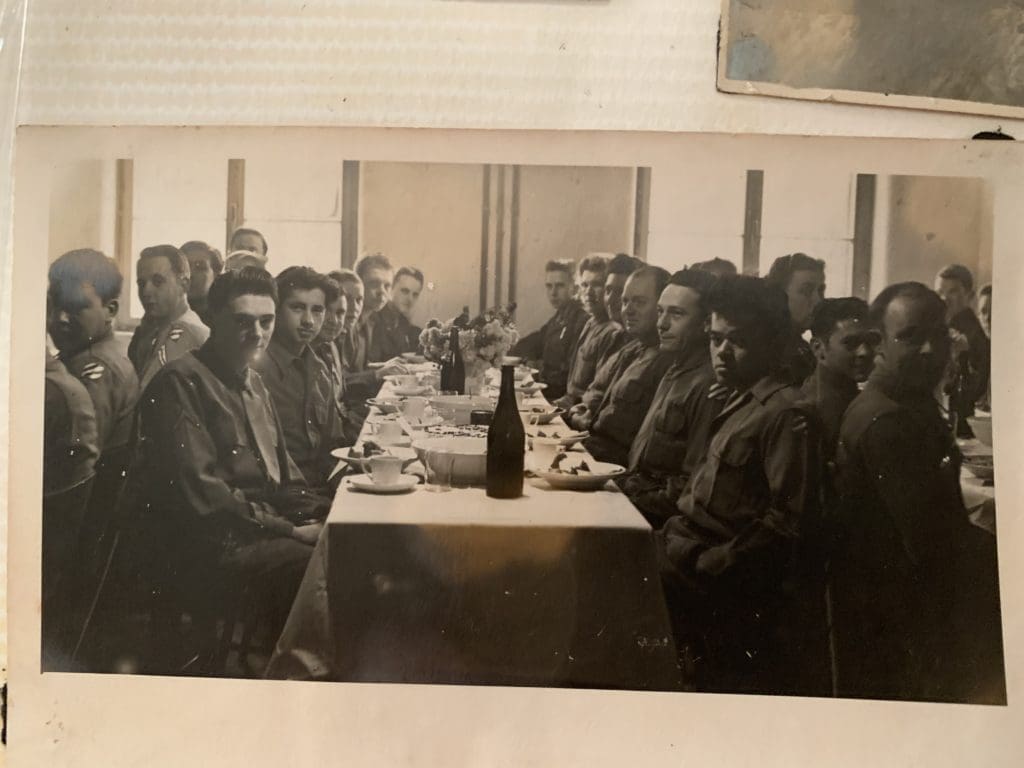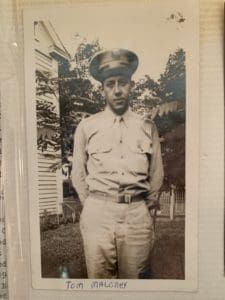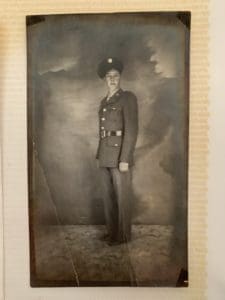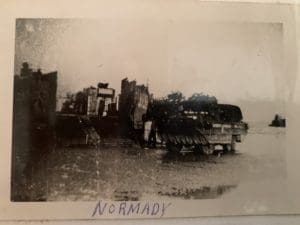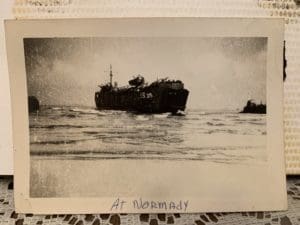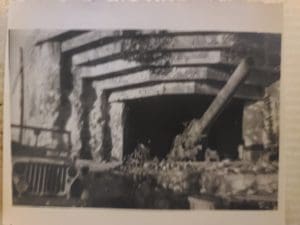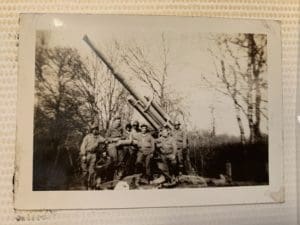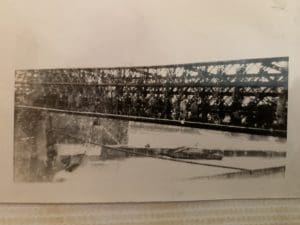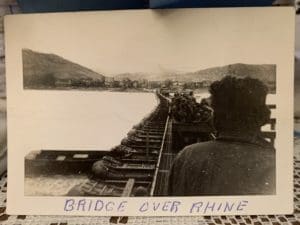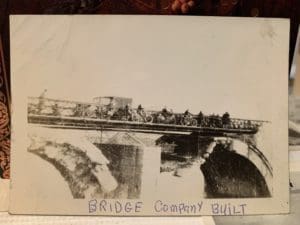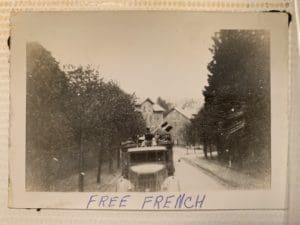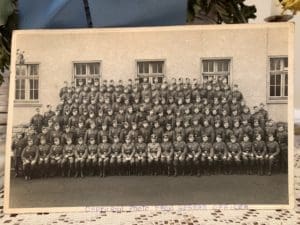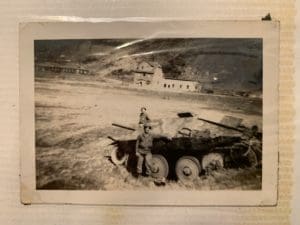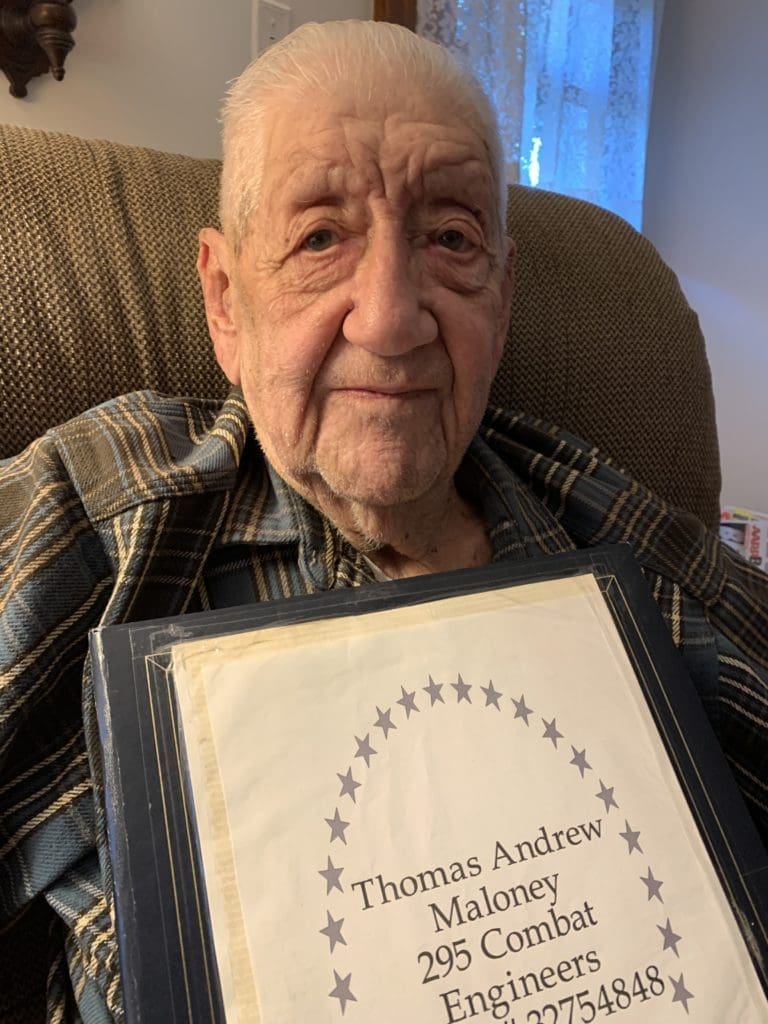Tom Maloney holds the hunting knife his father gave him and which became his only weapon running onto Utah beach.
Tom Maloney and his commanding officer were the first off their landing craft at Utah Beach during the 1944 D-Day invasion of Normandy.
They dropped into 10 feet of water.
Both were forced to ditch their packs and guns to reach the surface again.
Able to climb back on the transport, Maloney’s enraged captain grabbed a gun off one of his men and put it to the head of the sailor who had landed the boat.
“I’ll blow your damn head off,” the captain told the sailor. “You back this boat up. Next time she stops, she better be high and dry.”
She was, and the troops raced across the sand amid bullets and bombs. The only thing Maloney carried was a hunting knife his daddy had given him before he left for war.
He didn’t fret.
“You’re always going to find somebody dead, and he would have rations and stuff,” the 98-year-old Milford resident said. “And I knew guns and stuff like that were plentiful.”
Participating in D-Day is one of many dramatic memories that Thomas Andrew Maloney has of his three years overseas during World War II as a member of the 295 Combat Engineers. His crew built roads and bridges for troops to pass over.
He can still reel off his serial number: “32. 75. 48. 48. You never forget that.”
Maloney was 19 when he was drafted in 1942. Raised on a farm in Milford Neck, a few miles east of Milford, he had dropped out of high school in 11th grade and was working at a bomber factory in Baltimore, fitting ball turrets into planes on an assembly line.
The oldest of six boys, he was the first of five to go to war.
His service would take him to Africa, Italy, the British Isles, Belgium, France and Germany.
He’d help burn wool uniforms in Africa, suffer through the Battle of the Bulge without winter clothes, single handedly shoot down a strafing German plane on Utah beach, blow up a bunny he thought was a Nazi, hunt deer for fresh meat with a Native American sergeant who called him “country boy,” and sleep under trucks or in old buildings, but never in a tent, which he called “not much good.”
Neither was a chicken coop he chose on the way to Germany. He leaned a board up against a wall so he could sleep on it.
“Within about 15 minutes I had about 1,000 chicken lice on me,” he said. “Man, I couldn’t stand it.”
Maloney’s wife of 75 years, Gladys, and son Barry say Maloney didn’t talk much about the war for decades. Then about 25 years ago, the child of a neighbor asked Maloney to come to his class at nearby Lula B. Ross Elementary for show-and-tell.
That seemed to loosen the tide of memories. Now he talks more freely about it.
“They said you had a choice,” Maloney said of being drafted. “I told them I wanted to be a sailor. They put me in the Army.”
He met other draftees at the Milford train station to travel to Fort Dix, where they were inducted. Maloney was put on a train to Camp Walker in Texas, a former cavalry post turned troop-training camp.
“We rode three days and nights,” Maloney remembers. “We’d ride forward all day and then backed up half the night. I guess it was due to military traffic.”
Training wasn’t difficult for a farm boy, he said, but it also wasn’t exciting to be in the Army.
“Just hard work,” he said.
Maloney went with the flow. He was in good physical shape. He passed the 30-mile march test with no problems. And he’d used a gun to shoot rabbits back home, so he rated high for marksmanship.
Maloney was sent to radio school, where he studied codes and more. He didn’t like it, saying he went in “dumber than the devil and come out dumber.”
Between the radio training and his marksmanship rating, he was assigned to stay with the commanding officer of the company, “practically in his pocket, you know? Everywhere he’d go, I had to go.”
After training, the troops were allowed to go home to see their families. On the train ride back to Delaware, he and a buddy — “Joe Jonas’s son from over to Harrington” — decided in St. Louis that they wanted a beer. The conductor helpfully pointed out a joint right around the corner where they could get one.
As they opened the doors of the bar, they glanced back to see their train pulling out. But because they were in uniform, they could ride any train and found a Flyer headed to Philadelphia. They beat the troop train by five hours.
Maloney was assigned to a company of mostly older soldiers — “some of them were 35 years old” — who had worked in Panama together. He credits them with taking care of the new guys and keeping a lot of them alive by training them well: “Do this. Do that. Don’t do this. Don’t do that.”
- Tom Maloney in his World War II uniform.
- Tom Maloney in his World War II uniform.
His company would become part of a convoy of 90 ships that left New Hampshire in the dead of night bound for Africa. The convoy changed directions every six minutes, he said, to avoid German subs and to confuse anyone watching about their destination.
They left Aug. 6, 1942 and landed in Ireland and Scotland before arriving in Africa in November.
“We damn near smothered,” Maloney remembers. “We had wool clothes on.”
Temperatures there were summer-like and sometimes rose to 110 degrees, Maloney said.
The officers finally ordered the men to take them off, pile them up and burn them. Everybody was issued light-weight uniforms, which they still had on two years later in the Battle of the Bulge.
Maloney remembers liking Gen. Omar Bradley there, but didn’t like Gen. George S. Patton. He said Patton was only concerned with achievement and didn’t care how he accomplished that or what it cost. He remembers seeing them and British Gen. Bernard Montgomery now and then.
After battles, Maloney said, native people would steal clothes from the dead Americans leaving them naked in the sun. When Bradley saw it, he told the troops the next time they saw someone stealing uniforms to “shoot the son of a bitch.”
He once saw 5,000 prisoners of war standing in line in Africa. They had been troops under German Gen. Erwin Rommel, who was beaten by Patton. The Germans were being shipped back to the States and all over the world, Maloney said.
One German officer wearing a long coat forced a German private to come over and shine his shoes.
An Allied MP walked over and hit the officer with a softball bat.
“You don’t give any orders,” the MP told him. “We give the orders from now on.”
His company was sent to Sicily, landing on both Angio and Salerno beaches there and wading ashore like it was a normal day. There was no resistance visible.
Maloney was walking alongside an Italian man from New Jersey named Mitch Vitarelli. Someone hidden in marsh grass yelled, “Hey, throw me a cigarette, Bud.”
Vitarelli stopped Maloney from complying.
“Don’t,” Vitarelli said, and showed Maloney a grenade in his hand. Vitarelli tossed the grenade toward the voice.
“It was a German,” Maloney said. “They were waiting for us to get on the shore. Vitarelli just knew the difference in the language, the tone of it, and I didn’t.”
The company would move through to Rome before being sent to England to prepare for D-Day.
The prettiest place Maloney said he’s ever seen was a mountain top in Italy — he’s no longer sure where — that the captain had them march up, repeatedly winding their way around the mountain to get there. They spent the night before returning to work further down.
For D-Day, his company was sent to Glasgow, where they were housed in big hotel packed with soldiers. The harbor was so full of ships that anyone could walk a long way just by crossing the ship decks, Maloney said.
- Tom Maloney has this scrapbook photo labeled ‘Normandy.’
- “At Normandy” says this photo in Tom Maloney’s scrapbook.
The landing scene in “Saving Private Ryan” in which troops come on to the beaches on D-Day was “pretty much to the point,” Maloney said.
Troops had one focus as they disembarked, he said: “Run as hard as you could.”
His company lost about 20 men during the landing.
At Normandy, the chief goal of Maloney’s engineering company was to get supplies and equipment including tanks and bulldozers, ammunition and food supplies off boats from England and set up for use before they moved island, arriving in Belgium four days later.
Coming shore, Maloney was running beside a man who said, “Hot this morning, isn’t it,” and Maloney said, “Yeah.” The guy suddenly dropped to the ground.
“What did you see,” Maloney demanded as he dropped, too. Then Maloney realized the man wasn’t moving and saw splinters everywhere. His companion had a shovel strapped to his back and a bullet had gone straight through him, killing him and shattering the shovel’s handle.
“Damn,” Maloney thought.
In the early fighting, Maloney’s men were told to dig in. He was hunkered down in a ditch.
Bullets were zinging back and forth above his head. Then he heard something coming his way. As the sound got closer, he saw something dark against the sky.
“That’s a German helmet,” he thought. “I took a hand grenade out and I throwed it there.”
It was a bunny.
“I blowed that rabbit high as a ceiling,” he said.
The men on the beaches had standing orders to shoot down anything under 100 feet above the beach.
One day, Maloney was watching a German plane strafe the beach heading right toward him.
“I had a submachine gun in my hand and I said, ‘Well, I’m going to hold it right on the nose,’ and turned loose.”
He could see the pilot react to the gunfire and thought he’d dropped a gas tank.
“But it was a damn bomb. Landed maybe 50 feet from me in that marsh,” Maloney said. “Knocked the wind out of me and I thought I was dead for a few minutes.”
But he’d downed the plane.
The company shot one of its own pilots down three days in a row, he said.
“He had the same order. Don’t come in over the beach. He came in every time and he gets shot down.”
The pilot was able to bail out each time. The captain finally told the pilot that he had lost three planes needed in the war and that if his men saw him on the beach again, they were going to shoot him.
While the company was working to set up supplies, they braved small bombs dropped by German planes flying high at night. They would pepper the beaches. The bombs usually didn’t kill, but could cripple.
- This bunker is the one that Tom Maloney’s company was shelled by when arriving in Normandy.
- Tom Maloney says Allied troops captured this gun during World War II.
The company also was bombarded for days by a German in a 6-foot-thick reinforced concrete bunker who was lobbing shells at them every time he saw them working. The German could accurately hit 20 miles away, Maloney said.
When the allies finally captured the spot, various troops came to inspect it. It was loaded with gunpowder and huge shells. A group of sailors came to see it. One of them was smoking and the whole thing blew up.
“Green, green, green,” Maloney said.
Maloney said he enjoyed working with the engineering company.
“I learned something every day,” he said.
The most amazing thing his company built was a bridge across the Albert Canal in Belgium after D-Day. It was 75 feet off the ground and 300 feet long, and they had 48 hours to build it before troops arrived to cross it.
The company did it by building a section and then extending another section from that. For every section that was extended, there were two sections in place to support it and counterbalance the weight. A dozer pushed the extension pieces out.
He didn’t like the pontoon bridges the troops built. They generally rested directly on the water.
“It was a funny feeling crossing one,” he said. “It sinks down as you go. Makes you think, I don’t know whether it’ll come up or not.”
- Tom Maloney believes this is the bridge his company helped build over the Albert Canal.
- Tom Maloney’s engineering company built this pontoon bridge across the Rhine.
- This is a bridge that Tom Maloney’s engineering company built during World War II.
Maloney was stunned at what he considered the “antique” way of farming in villages he passed.
At one house, people kept their chickens and farm animals inside their homes under the same roof. When he asked why, they told him everybody stayed warm.
At another house he watched a man and woman wrestle with a hand-pulled plow.
Nobody seemed to know about modern conveniences such as tractors, he said.
At the Battle of the Bulge, he said, everybody assumed anybody they met was an enemy.
The Allies gave their soldiers clickers and a new code to memorize each night. One might click three times, and if the answering person didn’t click twice, they’d be shot.
Sometimes there was a verbal code. A stranger would be asked “How’s the tide today” and they better know the response, Maloney said.
His captain once ordered him to accept the surrender of a German officer. A private first class, Maloney was surprised, but his captain told him it was a way to hurt morale of prisoners.
The German officer expected to surrender to an officer. Making him surrender to a private was an insult that told him what the Allies thought of the Germans, Maloney’s officer explained.
Maloney took the man’s Luger, wallet and personal effects including a photo of his military company, a picture of a building in Germany and a photo of the officer’s daughter.
- This Tom Maloney photo is labeled “Free French” and was taken after D-Day.
- Tom Maloney took this photo of a German military company from an officer surrendering at the end of the war.
- This unlabeled photo is in Tom Maloney’s scrapbook.
Maloney still has the photos in a scrapbook. Years later, after nearly shooting a stranger with the Luger, Maloney traded it for an aluminum boat, he says with a laugh.
His scrapbook is filled with small black-and-white photos he took along the way.
“You weren’t supposed to take pictures, but I did,” Maloney said. “I had this little German camera. Nobody ever said anything.”
As the war neared the end, Maloney was riding with his captain through mountains when he spotted something along the road ahead. His captain told him he was always seeing something, and Maloney argued that was his job and told him he’d prove it.
They stopped the jeep and Maloney aimed the 50-caliber gun they had at the spot. A German soldier jumped up and held his hands up in surrender.
He was 16 years old and headed home because he said the war was almost over. They turned him over to MPs.
Later, Maloney would be amazed at a column of thousands of German prisoners marching orderly down the German Autobahn — the equivalent of an American interstate — with only a few armed Allied troops guarding them here and there.
Honorably discharged after the war, Maloney celebrated with a keg of beer.
He returned home to find all that was left of his Hudson Terraplane was two head lamps in the dirt. But all of the Maloney brothers came home from war.
Most soldiers didn’t talk about the war, he said. They just wanted to get on with life.
Maloney opened a service station with a friend and then did heavy construction work, handling big machinery. He worked for six years in Ocean City putting in water and sewer lines, a job he liked because he respected the meticulous nature of his bosses and the work they wanted to do.
Not long after returning, he met Gladys at a dance at the American Legion. Dances were held every Saturday night. She knew some of his brothers, but not him.
They dated for two months before they got married.
“Wasn’t I brave?” said Gladys, who grew up in nearby Milton.
They had two sons. One, Eddie, recently died.
Maloney thought he was relatively unaffected by the war, but years after it, a 6-foot stranger walked into his house in the middle of the night. Maloney grabbed the Luger, aimed it at the guy and marched him out of the door.
Even though Maloney recognized that it was an over-reaction, it was hard not to pull the trigger, he said. He now thinks that reaction was related to the war.
Gladys called for help and when an officer arrived, he was dismayed to see the man, who had wandered into another house that night. The stranger didn’t speak English and was working in Milton. The officer took him back to Milton and warned him against returning to Milford.
Maloney can’t express how the war affected his faith or religion, but said he used to lay awake at night during the war praying the fighting and things he’d seen never happened in the U.S.
“I’ve seen dead kids, and I saw a whole family sitting around a table dead. Every one of them. A shell had landed close by and it just sucked the life out of them, I guess.”
He doesn’t subscribe to the notion of being a member of the Greatest Generation.
“I don’t pay much attention to it,” he said.
Maloney believes that in general people were more honest and straightforward then and not as likely to lie, cheat someone or skimp on work as people seem to be today.
He’d like to see some of those places he saw during the war, but has never been able to.
“I’m sure they must have changed awful,” he said.
He and his family were talking a few years ago about traveling to Europe so he could see some of his war destinations. The COVID-19 pandemic put an end to those talks.
Maloney enjoys talking to kids about the war.
His message to them is simple.
Whatever they want to do, “just keep at it. Just keep plugging along,” he said. “Just do the best you can do.”


Betsy Price is a Wilmington freelance writer who has 40 years of experience, including 15 at The News Journal in Delaware.
Share this Post

